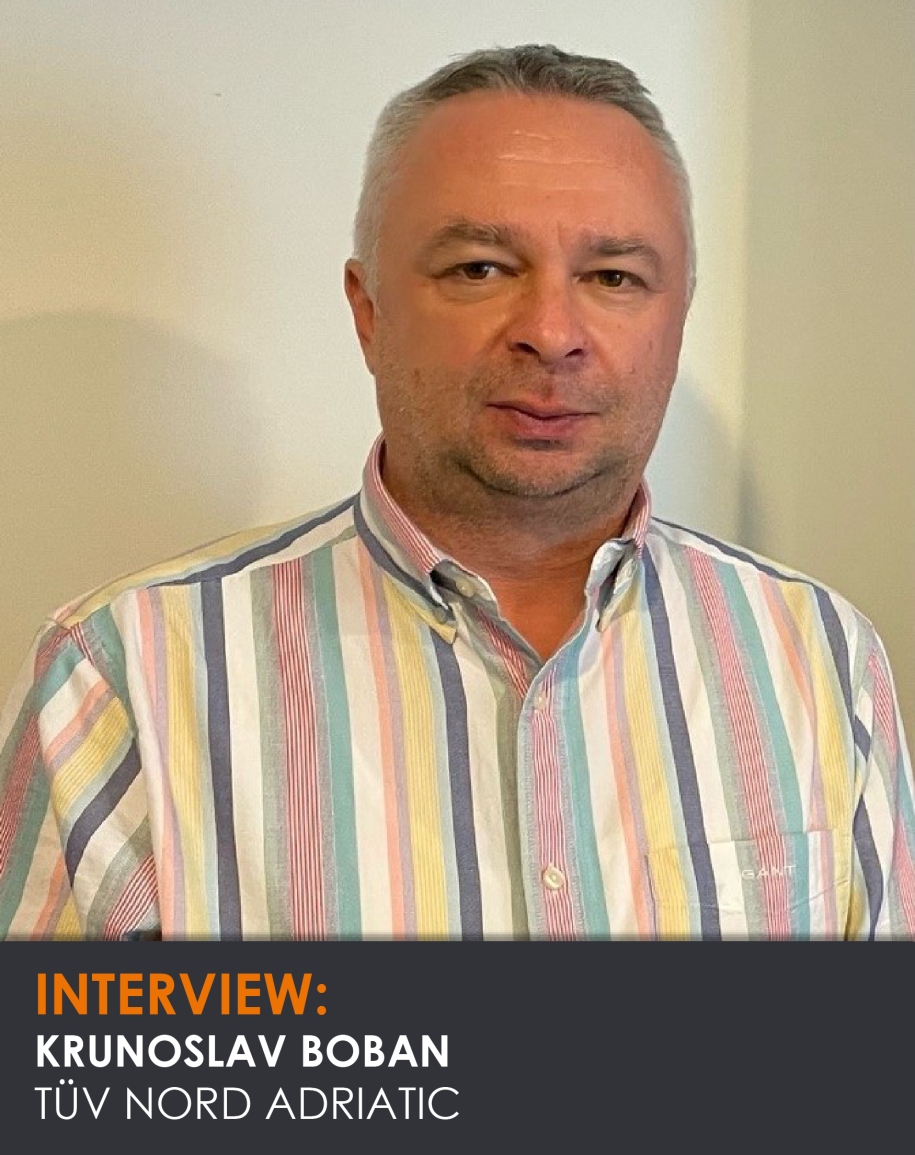Krunoslav Boban from TÜV NORD Adriatic makes prediction on who will have advantage in the pellet market in the future
Our interview for February 2024 is with a representative of an ENplus® Certification Body with broad experience. It is a pleasure to introduce to you Krunoslav Boban from TÜV NORD Adriatic who has a lot to say about certification within the biomass sector.
What should we know about TÜV NORD Adriatic d.o.o.?
TÜV NORD GROUP employs more than 15,000 employees. We are present in over 80 countries around the world, so we can freely say that we are available to our clients anywhere in the world where their business activities take them.
TÜV Croatia (today TUV NORD Adriatic) was founded in 1997 by RWTÜV Essen, and after the merger in Germany it became 100% owned by TÜV NORD GROUP. In April 2021, we changed our name to TÜV NORD Adriatic d.o.o.
The reason for the name change is the new regional approach of the TÜV NORD Group, whereby the company TÜV Croatia with the new name TÜV NORD Adriatic becomes a regional company that leads the development in the entire region.
TÜV NORD Adriatic covers the territory of Croatia, Bosnia and Herzegovina, Slovenia, Serbia and Kosovo. The headquarters of the company are located in Zagreb, but we have offices also in Slavonski Brod, Osijek, Rijeka, Split, Sarajevo, Banja Luka and Belgrade.
In cooperation with the parent company TÜV NORD GROUP, our company offers most of the services from the area of activity of TÜV NORD relying on our own experts. Of course, the complete infrastructure of the TÜV NORD GROUP is available at all times, so that the high level of service quality defined at the level of the group is maintained.
As a Certification Body for ENplus® you help companies get certified for producing pellets of a high quality. How many companies have you certified over the years?
Yes, as an accredited certification body in the pellet production area, we are available with rich multi-year experience in the field of biomass use and cover additional services of certification of other management systems in the sustainability area.
In the last couple of years, we have successfully conducted ENplus® certification for 14 companies, most of them in Croatia (total of 22 valid certificates).
Tell us more about the experience you have with these pellet producers and traders.
We started cooperation with pellet producers in cooperation with TUV NORD CZECH in 2015, and as they have given up the ENplus® certification in the meantime, we made the decision to continue and assume business obligations towards existing clients. In 2018, we started developing documentation and in 2019 we were recognised as an ENplus® cCertification Body, and we contracted the activities of the testing body with ENplus® Testing Body HEP Proizvodnja d.o.o. – Central Laboratory for Chemical Technology (laboratory in Zagreb, Croatia).
It is important to note that we have many years of experience in the wood industry in our region and that we are the leader in the region and very proud to have issued more than 400 valid certificates in the area of FSC COC.
The cooperation with Bioenergy Europe and the expansion of services in the area of biomass use and processing is confirmed and proven through new services we added to our portfolio – for example, our involvement in the SURE system certification scheme. We carried out the certification of the company Hrvatske šume, the largest forest management and biomass production company in Croatia and the main supplier of all pellet production companies in Croatia.
Moreover, alongside the HEP Proizvodnja d.o.o. laboratory. – Central Laboratory for Chemical Technology, we were a partner to Bioenergy Europe for the organisation of two training courses for ENplus® Quality managers that were held in 2023 in Croatia.
I would like also to emphasize that last year we certified several clients of pellet producers in accordance with the international standard ISO 50001 – Energy Management System, which received the certificate after the audit because they meet the measures to increase energy efficiency and reduce CO2 emissions while using renewable sources in the process of wood pellet production.
You often communicate with the certified companies. In your opinion, what is their main reason to stay certified in the long term?
Of course, there is constant communication, not only concerning the ENplus® certification, but also in other areas related to the processing and use of biomass (other management systems), and reduced greenhouse gas emissions in accordance with EU directives. The main reason is precisely that the companies have the TUV NORD group with them as a safe, reliable and high-quality partner in the field of biomass. In the end, because of the ENplus® certification, their pellets are perceived in the market as a renewable energy source, a product that guarantees energy efficiency, less CO2 emissions and reduced maintenance costs.
If you have to make a prediction for 2024, do you expect more companies to apply for an ENplus® certificate?
Hmm, a difficult question because we leave behind a very turbulent period on the pellet market. I can only say that these companies that make additional investments in the production of electricity and thermal energy for the production of pellets from other energy sources (emphasis on renewable energy sources) will certainly have a big advantage, because biomass is becoming an increasingly important factor in achieving the goals of reducing the carbon footprint. So probably the importance of the ENplus® certificate will increase even more in the long term along with other certificates. Key role will be played by the raw material, which will be interesting for everyone else apart from pellet producers, considering the new RED III directive.

